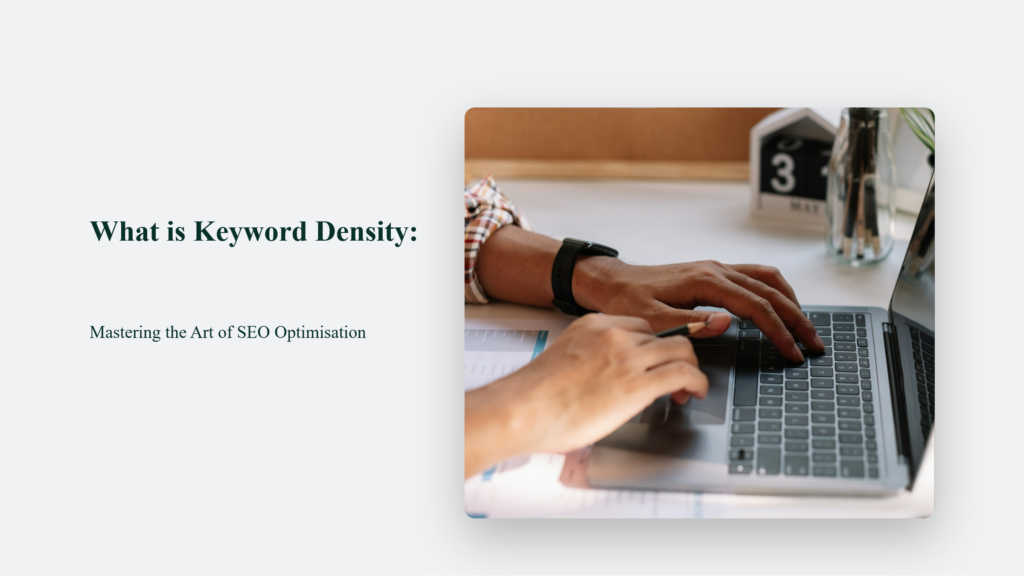In the ever-evolving landscape of search engine optimisation (SEO), the concept of keyword density has been a topic of much debate and discussion. While some SEO experts swear by its importance, others dismiss it as an outdated metric.
As with most things in life, the truth lies somewhere in between. Keyword density, when approached strategically, can be a powerful tool in your SEO arsenal, helping you rank higher and drive more targeted traffic to your website.

Understanding Keyword Density
Keyword density is the percentage of times a specific keyword appears in a piece of content relative to the total word count. For example, if your article has 1000 words and your target keyword appears 10 times, your keyword density is 1%. But why does keyword density matter?
Search engines use algorithms to understand the relevance and context of your content. By strategically placing your target keyword throughout your content, you signal to search engines that your page is highly relevant to that particular search query.
However, it’s essential to strike a balance. Overusing your keyword, known as “keyword stuffing,” can harm your SEO efforts. Search engines may penalise your site for manipulative tactics, resulting in lower rankings.
Best Practices for Optimising Keyword Density
When optimising your keyword density for SEO success, there are several best practices to remember. By following these guidelines, you can ensure your content is search engine-friendly and engaging for your readers.
Use Your Keyword Naturally
One of the most important aspects of keyword density optimisation is using your keyword naturally throughout your content. Instead of forcing your keyword into every sentence, use it where it makes sense and flows seamlessly with the rest of your text. For example, let’s say you’re writing an article about “healthy breakfast ideas.”
Instead of repeating the phrase “healthy breakfast ideas” in every paragraph, you could use variations like “nutritious morning meals” or “wholesome breakfast recipes.” It helps your content sound more natural and less like it’s been stuffed with keywords.
Aim for a Keyword Density of 1-2%
While there’s no magic number for keyword density, most SEO experts recommend aiming for a density between 1-2%. It means that for every 100 words in your content, your target keyword should appear 1-2 times. For instance, if you’re writing a 1000-word blog post, your keyword should appear 10-20 times throughout the article.
It ensures that your keyword is prominent enough to be recognised by search engines without being overused, which can actually harm your SEO efforts.
Place Your Keyword in Strategic Locations
In addition to using your keyword throughout the body of your content, it’s important to place it strategically on your page. It includes:
- Title tag
- Meta description
- URL
- Headings (H1, H2, etc.)
- Image alt tags
- First and last paragraphs
By including your keyword in these critical areas, you help search engines understand the main focus of your page and improve your chances of ranking for that particular term.
Use Variations and Related Keywords
While using your primary keyword throughout your content is important, don’t rely solely on one exact match phrase. Instead, use variations and related keywords to provide context and avoid repetition.
For example, if your main keyword is “content marketing,” you could also use phrases like:
- Digital Marketing
- Inbound Marketing
- Blogging
- Social media marketing
- SEO content
Using these related terms helps your content sound more natural, allows you to rank for a wider range of keywords, and attracts a broader audience.

Common Misconceptions about Keyword Density:
- High keyword density guarantees better rankings. The higher the keyword density, the better the chances of ranking well on search engines. It has led to the practice of keyword stuffing, which overloads content with keywords. However, search engines now use complex algorithms that analyse content quality and context and can penalise sites for keyword stuffing.
- Every piece of content should have the same keyword density. Different types of content may require different keyword-density approaches. For example, blog posts should aim for 1-2% to flow naturally, while product descriptions may have a slightly higher density of 3-5% to convey relevant information.
- Exact keyword matching is crucial. Repeating the exact keyword verbatim throughout the content is key to high density and rankings. However, search engines now understand synonyms, plurals, and related terms, so using natural language and keyword variations can be more effective.
- Keyword density is a significant ranking factor. Google has confirmed that keyword density is not a major ranking factor and has discouraged focusing on it for years. Search engines have evolved to understand content beyond just keyword frequency.
- The more keywords used on a page, the better it will rank. Integrating keywords too often leads to keyword stuffing, a negative ranking factor. Google may penalise sites for overusing keywords, as it’s seen as a manipulative black hat SEO tactic.
The Bottom Line:
By understanding keyword density and optimising it, you can create content that both search engines and users love. Remember, the key is to use your keyword naturally and strategically, not to stuff it into every sentence. With these tips and best practices, you’re well on your way to SEO success!
Frequently Asked Questions:
What is the ideal keyword density for SEO?
While there’s no perfect keyword density, most SEO experts recommend aiming for 1-2%. The key is to use your keyword naturally and avoid overusing it.
Can I use the same keyword multiple times on a page?
Yes, you can use your keyword multiple times on a page, but be sure to use it naturally and in context. Avoid repeating it unnecessarily, as this can be seen as keyword stuffing




